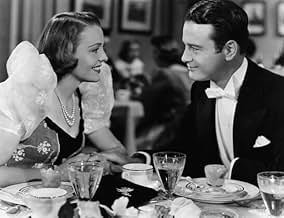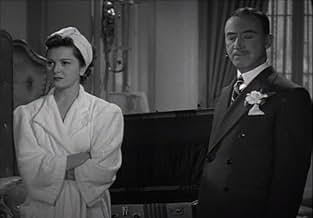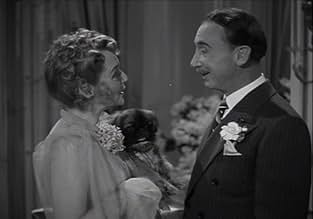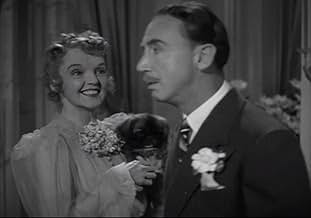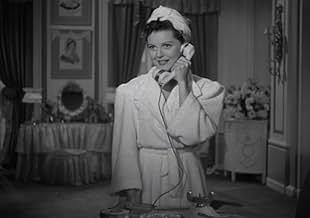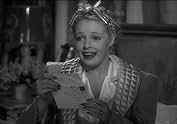CALIFICACIÓN DE IMDb
6.3/10
528
TU CALIFICACIÓN
Agrega una trama en tu idiomaA drunken college boy invites a taxi dancer to spend the weekend at his snobbish school.A drunken college boy invites a taxi dancer to spend the weekend at his snobbish school.A drunken college boy invites a taxi dancer to spend the weekend at his snobbish school.
- Dirección
- Guionistas
- Elenco
- Premios
- 1 premio ganado en total
Peter Lind Hayes
- Skel
- (as Peter Hayes)
Ernie Alexander
- Parking Attendant
- (sin créditos)
Rod Bacon
- College Boy
- (sin créditos)
Lee Bennett
- College Boy
- (sin créditos)
Opiniones destacadas
Minor B of more interest for its cast of up and coming future stars than the ordinary script.
Lana saddled with an unbecoming hairstyle is clearly being groomed for the big time. She still hadn't finished the transformation from the girlish Judy Turner to the sleek Lana but she is on her way, she's bright and spunky.
The film's lower budget origins are obvious in the fact that many of the plot points are teased along and then they and the actors involved simply disappear from the narrative.
The film's most intriguing character, the insecure and lost Betty, is assigned to the best actress of the bunch Marsha Hunt but unfortunately treated as a secondary player. Her actions are never fully explained and the aftermath of her story is completely ignored however she makes more of an impression than any of the other performers and you miss her when she's not on the screen. Actually her story could have made an interesting film on its own.
Slight but worth catching once for the cast.
Lana saddled with an unbecoming hairstyle is clearly being groomed for the big time. She still hadn't finished the transformation from the girlish Judy Turner to the sleek Lana but she is on her way, she's bright and spunky.
The film's lower budget origins are obvious in the fact that many of the plot points are teased along and then they and the actors involved simply disappear from the narrative.
The film's most intriguing character, the insecure and lost Betty, is assigned to the best actress of the bunch Marsha Hunt but unfortunately treated as a secondary player. Her actions are never fully explained and the aftermath of her story is completely ignored however she makes more of an impression than any of the other performers and you miss her when she's not on the screen. Actually her story could have made an interesting film on its own.
Slight but worth catching once for the cast.
This little-known film is a lot of fun. The dialogue is quite pointed and witty and the pacing is very good. Lana Turner is especially appealing, and the college boys' catty girlfriends are astounding when they get going with their bitchy badinage.
It may be lightweight fare, but the movie's still a revealing glimpse of the upper 1% of the 1930's. There's heartache aplenty when rich boy (Ayers) dates taxi dancer (Turner) from lower 99% and then stands her up in front of his snooty social circle. She's humiliated, to say the least, and we feel for her. Rich boy, Phil, has a lot to learn about life and people, and the remainder shows him trying to get things straight.
It's an MGM production so the glossy upper crust is spread on convincingly, from the high fashion clothes to the glittering ballrooms to the carefree attitudes. At the same time, the girls don't disappoint in the glamour department just as the title promises. We also get a cross-section of personality types from bitchy Daphne to misfit Betty to nice girl Carol. So it's lots of eye candy with some clumsy humor thrown in (the drunken Harvard man). But then, the movie turns dark near the end, and we see the downside of all the glitter (the stockbroker dad; an onrushing train). Notice, however, how biology ultimately triumphs over class.
The competition may be heavy but Turner shines as the working girl with stars in her eyes. But I especially like a rather obscure Jane Bryan (Carol) who projects an effortless inner radiance. Too bad that she left the business so soon. All in all, the film's a diverting peek into class mores of the time, a topic I expect still resonates with today's 99%.
It's an MGM production so the glossy upper crust is spread on convincingly, from the high fashion clothes to the glittering ballrooms to the carefree attitudes. At the same time, the girls don't disappoint in the glamour department just as the title promises. We also get a cross-section of personality types from bitchy Daphne to misfit Betty to nice girl Carol. So it's lots of eye candy with some clumsy humor thrown in (the drunken Harvard man). But then, the movie turns dark near the end, and we see the downside of all the glitter (the stockbroker dad; an onrushing train). Notice, however, how biology ultimately triumphs over class.
The competition may be heavy but Turner shines as the working girl with stars in her eyes. But I especially like a rather obscure Jane Bryan (Carol) who projects an effortless inner radiance. Too bad that she left the business so soon. All in all, the film's a diverting peek into class mores of the time, a topic I expect still resonates with today's 99%.
As a work of art, there is not much here - a poor cousin to "My Man Godfrey." As a "teaching moment," however, this film is a zinger. It tries to entertain but also to deliver a social message. It does so, so maladroitly that it ends up a perfect mirror of a mixed-up society, an almost-post-Depression society that was itself badly muddled and conflicted.
We are presented with a thoroughly obnoxious set of idle, moneyed, entitled, frivolous and uncaring young people. So much for a caricature of the upper classes. Ah, but then there is the heartwarming contrast with the poor but honest working-class heroine (Lana Turner - not a bad performance, but not quite convincing). So much for the clichéd social conflict. What lesson are we, the almost-post-Depression theater audience, intended to draw from this? Of course, the lesson is that we are all one. Even the obnoxious rich are not so bad. They will see the light. The rich boy and poor girl will marry. But do they? Not really. The rich kid loses his fortune. Not until then does he accept his love for the dime-a-dance girl. The once-rich-but-now-in-reduced-circumstances girl marries the poor student who must work his way through college. No one steps out of his or her economic sphere. The rest of the rich kids go off to continue their obnoxious, parasitic life-style. All is right with the world. No one is really bad. Smile. It is indeed extraordinary that the uber-rich kid's father is found to be a criminal. He has defrauded perhaps thousands of investors (probably including many poor investors) in his hedge-fund or Ponzi scheme; he's a veritable Bernie Madoff. Yet we are not expected to blame him or even to dislike him. "Thanks, dad, for having given me a good start in life," says his non-reproachful son. Capitalism is a tough business, not for the faint-hearted. It's all OK. The poor are virtuous. The rich are irritating but ultimately sympathetic. That is the lesson of "Glamour Girls." It's a message Hollywood was eager to deliver in 1939, and America was happy to receive. Maybe Hollywood was right. As the 19th century humorist Josh Billings, a friend of Mark Twain, put it, defining the American spirit: "Wealth won't make a man virtuous, but there ain't anybody who wants to be poor just for the purpose of being good."
As a social document, a relic of its time, the movie is revealing. As a film, a work of art, it is less than captivating - with one exception. That exception makes the whole thing worth seeing: the performance of Marsha Hunt. Her character, Martha, is the only one with depth. Her acting is the only one with profundity. Just watch her suicide scene. Watch her face as she drives toward her fatal moment. She registers nearly a dozen shifting emotions, all razor sharp and all without speaking a word, all in the space of a minute of screen time. First we see desperation as she speeds the car unheeding toward nowhere; then sadness; then surprise as she spots the train alongside; then a look of realization as the idea of what she can do strikes her; then happiness as it sinks in; then literal glee as she contemplates it; then fierce determination as she hits the accelerator; fear takes over as she reaches the crossing, fear as she nervously, fumblingly, lights a last cigarette; then glee again, a look of triumph as she stares at the sleeping drunken frat boy beside her - he will go down too. It is extraordinary acting. Marsha Hunt - I've seen her interviewed - said she didn't care to be a star. She wanted to be a character actress. She became one of the best. One year later she played the gawky, tone-deaf sister in "Pride and Prejudice." After that she played the heroic but devastated victim of Nazi oppression in "None Shall Return." She portrayed a nasty, conniving home-wrecker in "Smash-Up," then a gentle, conflicted lover in "Raw Deal." If nothing else, "Glamour Girls" gives us one sublime actress at her peak.
We are presented with a thoroughly obnoxious set of idle, moneyed, entitled, frivolous and uncaring young people. So much for a caricature of the upper classes. Ah, but then there is the heartwarming contrast with the poor but honest working-class heroine (Lana Turner - not a bad performance, but not quite convincing). So much for the clichéd social conflict. What lesson are we, the almost-post-Depression theater audience, intended to draw from this? Of course, the lesson is that we are all one. Even the obnoxious rich are not so bad. They will see the light. The rich boy and poor girl will marry. But do they? Not really. The rich kid loses his fortune. Not until then does he accept his love for the dime-a-dance girl. The once-rich-but-now-in-reduced-circumstances girl marries the poor student who must work his way through college. No one steps out of his or her economic sphere. The rest of the rich kids go off to continue their obnoxious, parasitic life-style. All is right with the world. No one is really bad. Smile. It is indeed extraordinary that the uber-rich kid's father is found to be a criminal. He has defrauded perhaps thousands of investors (probably including many poor investors) in his hedge-fund or Ponzi scheme; he's a veritable Bernie Madoff. Yet we are not expected to blame him or even to dislike him. "Thanks, dad, for having given me a good start in life," says his non-reproachful son. Capitalism is a tough business, not for the faint-hearted. It's all OK. The poor are virtuous. The rich are irritating but ultimately sympathetic. That is the lesson of "Glamour Girls." It's a message Hollywood was eager to deliver in 1939, and America was happy to receive. Maybe Hollywood was right. As the 19th century humorist Josh Billings, a friend of Mark Twain, put it, defining the American spirit: "Wealth won't make a man virtuous, but there ain't anybody who wants to be poor just for the purpose of being good."
As a social document, a relic of its time, the movie is revealing. As a film, a work of art, it is less than captivating - with one exception. That exception makes the whole thing worth seeing: the performance of Marsha Hunt. Her character, Martha, is the only one with depth. Her acting is the only one with profundity. Just watch her suicide scene. Watch her face as she drives toward her fatal moment. She registers nearly a dozen shifting emotions, all razor sharp and all without speaking a word, all in the space of a minute of screen time. First we see desperation as she speeds the car unheeding toward nowhere; then sadness; then surprise as she spots the train alongside; then a look of realization as the idea of what she can do strikes her; then happiness as it sinks in; then literal glee as she contemplates it; then fierce determination as she hits the accelerator; fear takes over as she reaches the crossing, fear as she nervously, fumblingly, lights a last cigarette; then glee again, a look of triumph as she stares at the sleeping drunken frat boy beside her - he will go down too. It is extraordinary acting. Marsha Hunt - I've seen her interviewed - said she didn't care to be a star. She wanted to be a character actress. She became one of the best. One year later she played the gawky, tone-deaf sister in "Pride and Prejudice." After that she played the heroic but devastated victim of Nazi oppression in "None Shall Return." She portrayed a nasty, conniving home-wrecker in "Smash-Up," then a gentle, conflicted lover in "Raw Deal." If nothing else, "Glamour Girls" gives us one sublime actress at her peak.
This film is a good example of MGM's early attempts to establish a screen persona for Lana Turner. Her role here as a dance hall hostess is similar to the rags-to-riches roles that Joan Crawford had successfully played early in her own career a decade earlier. However, Lana Turner just wasn't made to wear rags, and it wasn't until MGM put her into satins and jewels that audiences really responded.
This film is an entertaining mix of romantic comedy and social class commentary. The university town ("Kingsford") is obviously patterned after Princeton, NJ. (The eating clubs that host the prom in the film are still very much thriving institutions at Princeton.) There's a strong supporting cast and the condescending attitudes of some of the upper crust girls toward Turner is refreshingly realistic. (Amusingly, Turner apparently has red hair in this black-and-white film. Other characters refer to her as "Red").
This film is an entertaining mix of romantic comedy and social class commentary. The university town ("Kingsford") is obviously patterned after Princeton, NJ. (The eating clubs that host the prom in the film are still very much thriving institutions at Princeton.) There's a strong supporting cast and the condescending attitudes of some of the upper crust girls toward Turner is refreshingly realistic. (Amusingly, Turner apparently has red hair in this black-and-white film. Other characters refer to her as "Red").
¿Sabías que…?
- TriviaFirst film where Lana Turner receives top billing.
- Citas
Jane Thomas: Listen, you wisecracking, bad-mouthing glamour girl. I've had all your kind of friend that I can use. Why, I wouldn't breathe the same air with you and your pedigree polo shirts for another five minutes.
- ConexionesFeatured in Discovering Film: Lana Turner (2015)
- Bandas sonorasLoveliness
(1939)
Music by Edward Ward
Lyrics by Bob Wright and Chet Forrest
Played during the opening credits
Sung by Dale Fellows (uncredited) at the social
Hummed by Lana Turner (uncredited)
Played as background music often
Selecciones populares
Inicia sesión para calificar y agrega a la lista de videos para obtener recomendaciones personalizadas
Detalles
Taquilla
- Presupuesto
- USD 403,000 (estimado)
- Tiempo de ejecución1 hora 19 minutos
- Color
- Relación de aspecto
- 1.37 : 1
Contribuir a esta página
Sugiere una edición o agrega el contenido que falta


